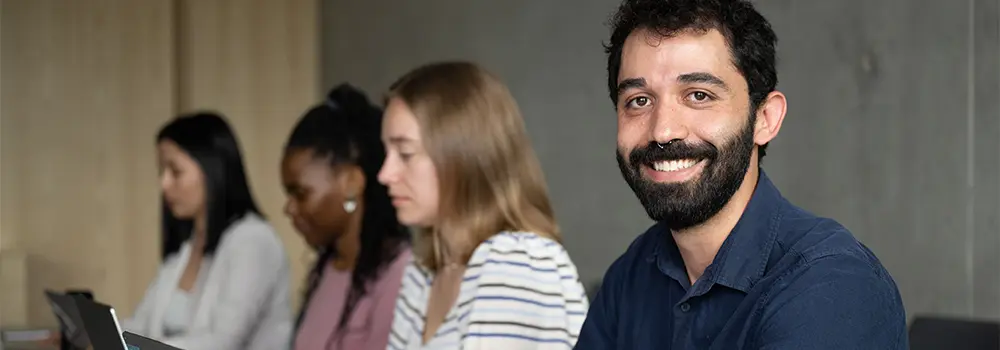Specializations

Currently, Brandt School is offering four specializations, based on the research areas of our core academic staff. Students choose their specializations according to personal interests and professional aims. From the first to the third semesters, they complete two of the specialization modules. Each specialization module consists of elective seminars and a module examination. The variety of courses offered helps students develop and specialize their individual profiles - especially when topically connected to the practical training and thesis.
Students complete two out of the four following specialization modules:
Specialization Modules
The Development and Socio-Economic Policy module deals with development policy, policies for fighting poverty and inequality, economic and social development and progress. The seminars investigate questions like "Do aid policies work?", "Do we progress? What kind of progress and how do we measure it?" Conceptualizations of progress or good governance are examined extensively and are broadened and the impact of policies is evaluated.
The Conflict Studies and Management specialization provides students with a platform to explore the exchange of practitioners and scholars’ knowledge on peace, security, and development promoting dialogue around these multidimensional issues following theory, empirics, and practice in peace and conflict research for public policy design, intervention, and evaluation. The specialization seeks to build relations between scholars and practitioners interested in the wider dynamics of political conflict, dialogue, diplomacy, and peacebuilding, using a multidisciplinary focus and familiarizing students with diverse methodological approaches to the subject. Within the research field of conflict management, the Brandt School seeks to develop policies that prevent violence, promote positive peace, and contribute to capacity building in societies.
Students in this specialization will have the opportunity to access classes, workshops, and seminars with experts from around the world and encounter courses like:
- Forced Migration Policies in Comparative Perspective
- Race, Racism & Global International Relations
- Justice and Reconciliation in Post-Conflict Societies
- The Research Lens on Public Policy Intervention and Evaluation
- Gender, Peace, and Conflict
They also could be part of Project Groups where they will have the chance to act as policy advisors and publish policy briefs for decision makers like in the: Project Group “Armed State Actors and Transitional Justice”, or apply for funding to access resources and have the experience to manage budgets and design interventions and evaluation tools like in the “Everyday Practical Peacebuilding Project”.
This specialization equips students with the skills and mindset needed to drive impactful social change. With a strong emphasis on social innovation and leadership, it combines rigorous academic training with practical approaches to problem-solving. Through critical and creative exploration, students are encouraged to develop entrepreneurial solutions that address complex challenges in the public and nonprofit sectors, fostering a new generation of leaders dedicated to transformative action across diverse fields.
Change, creativity, and innovation are the driving forces behind the so-called entrepreneurial economy, which is characterized by a high degree of turbulence. The shift from a traditional market economy to an entrepreneurial one has significantly impacted the policy-making process. Policymakers now face the challenge of developing new entrepreneurship policies to promote sustainable and resilient development at the local, regional, and national levels. Policymakers do meanwhile acknowledge the importance of entrepreneurship for sustainable, bottom-up development.
In this specialization, we go beyond traditional paradigms, exploring the diverse forms of entrepreneurship policies and policymaking, including digital, social, sustainable, institutional, administrative, and public entrepreneurship. Students are equipped with the skills and knowledge to navigate the evolving entrepreneurial landscape and contribute to sustainable, impactful change.
This specialization focuses on equipping students with the skills to lead and innovate within the public and nonprofit sectors. Through a curriculum that emphasizes entrepreneurial public policy making, public administration reform, and anti-corruption strategies, students gain a comprehensive understanding of both theoretical and practical approaches to addressing societal challenges. Dynamic, human-centered learning experiences foster collaborative and innovative thinking, while leadership development is prioritized to prepare students for transformative roles in areas like public health and governance. This program bridges the gap between theory and practice, creating leaders ready to shape the future of public service.
Do you need guidance?
Have it your way
Customize your MPP experience, find your favorite specializations and apply now! Find out more about requirements, deadlines and scholarships in the section on
If you would like to learn more about life as a student at the Brandt School, feel free to contact the
Brandt School Student Government
If you are interested in finding out more about the MPP and the Application Process, click here:
You can't decide on two specializations, yet? Of course you may revise your decision during the first weeks of the program.


